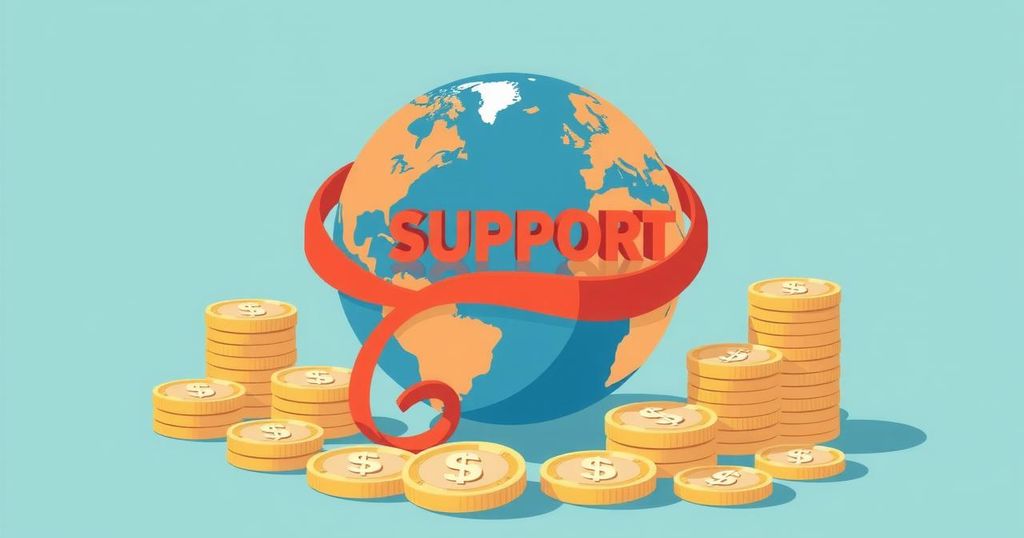Donors Commit €5.8 Billion in Aid for Syria Amidst Ongoing Challenges

At the Brussels IX Conference on March 17, 2025, donors pledged €5.8 billion in aid for Syria, a decrease from last year’s commitment due to reduced U.S. support. The conference saw participation from Syrian authorities for the first time, amidst ongoing violence that raises questions about stability. European leaders emphasized the necessity of continued international aid as Syria faces a severe humanitarian crisis.
At the Brussels IX Conference on March 17, 2025, donors pledged €5.8 billion in aid for Syria. This amount, while substantial, is a decrease from the previous year’s commitment of €7.5 billion, reflecting a significant decline in U.S. support. The aim of this aid is to assist Syria in its transition towards stability following 14 years of devastating civil war and the ongoing plight of millions of refugees.
For the first time, Syrian authorities, represented by interim Foreign Minister Assaad al-Shibani, participated in the conference, signaling a potential shift in international relations. However, escalating violence this month has cast doubts on the legitimacy and stability of the new Islamist-led authorities. The European Union announced that the total pledged includes €4.2 billion in grants and €1.6 billion in loans.
European Commission President Ursula von der Leyen highlighted that the EU would allocate nearly €2.5 billion in aid for this year and the next to support those affected by the conflict. Notable contributions, such as approximately $330 million from Germany and $210 million from Britain, underscore the collective international effort, despite U.S. aid cuts under President Donald Trump’s administration.
U.S. representative Natasha Franceschi articulated the historical context of American support, emphasizing that the U.S. has contributed over $18.3 billion over the past 14 years, while urging more substantial contributions from other nations. She affirmed that the U.S. would continue to provide aid aligned with its policies, yet anticipates increased financial responsibility from others.
Syria’s leadership, particularly the new head Ahmed al-Sharaa, has been vocal about the need for assistance to facilitate recovery, as the EU has relaxed some sanctions. Shibani expressed appreciation for the EU’s measures, yet he called for further action to enable recovery efforts. Despite progress, persistent violence, notably in which security forces reportedly killed nearly 1,500 civilians, raises urgent concerns.
The humanitarian crisis in Syria remains severe, with 16.7 million people requiring assistance. Mirjana Spoljaric, president of the International Committee of the Red Cross, cautioned against reducing investment in humanitarian aid, asserting it is essential to the survival of millions. The United Nations estimates that Syria could take over 50 years to recover economically to its pre-war conditions, underscoring the critical nature of sustained and increased support for recovery efforts.
In summary, the latest pledges for aid to Syria reflect a decrease in international commitment, particularly due to waning U.S. support. The presence of Syrian authorities at the conference marks a notable development in engagement, but rising violence jeopardizes plans for recovery. As humanitarian needs escalate, a unified global response remains essential to prevent further deterioration and facilitate Syria’s long-term stability and recovery.
Original Source: www.hurriyetdailynews.com








